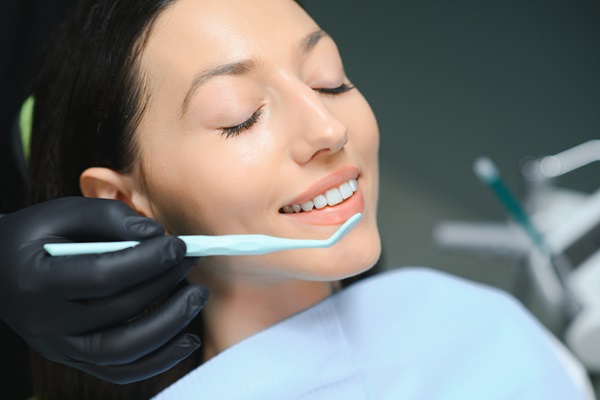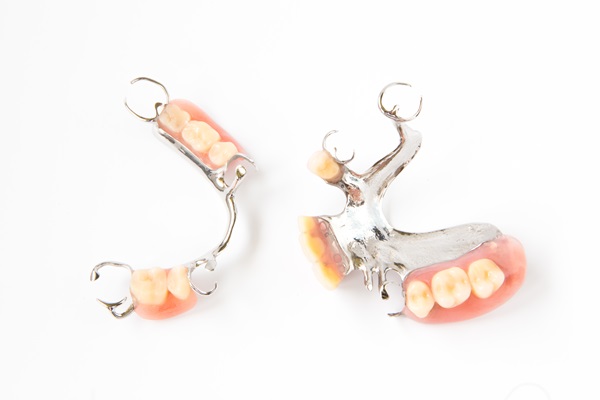 Dentures can replace multiple missing teeth, restoring your confidence and ease of eating. Now that you have your smile back, the next step is adjusting to new dentures. How do you take care of your new smile.
Dentures can replace multiple missing teeth, restoring your confidence and ease of eating. Now that you have your smile back, the next step is adjusting to new dentures. How do you take care of your new smile.
Denture care tips
While dentures are not real teeth, you must care for them as attentively as real teeth. That way, they last as long as possible and you protect your oral health and your investment.
Cleaning
Just like with real teeth, food and plaque cling to dentures and may cause gum disease. These dental restorations require regular cleanings with water, a soft-bristled brush, and a denture cleaning solution. Clean your dentures twice a day, but do not use toothpaste, as many brands have ingredients that may damage removable teeth. Instead, use a soft-bristled toothbrush made specifically for dentures.
After brushing your restoration, use regular toothpaste to brush your gums and tongue. Even if you have no natural teeth, you still have gums to protect and breath to keep fresh. Remember to brush and floss any remaining natural teeth while adjusting to new dentures. Follow up brushing and flossing with a mouthwash rinse. Use mouthwash made specifically for dentures or regular mouthwash after removing the appliance.
Eating
After eating, remove and rinse your dentures in warm water to get rid of food and other debris. In case you drop your removable teeth in the sink or on the bathroom counter while cleaning them, lay down a towel to cushion the fall. Another tip to avoid breaking your dentures is to handle them gently. Be careful that you do not damage or bend the clasps or plastic as you clean them.
Soaking
Most dentures must be kept moist to help them maintain their shape. Soak them overnight in a mild denture solution or water. Talk to your dentist about storing your replacement teeth properly. Also, consult the manufacturer's instructions to learn which soaking solution to use.
Scheduling
Work with your dentist to create a dental checkup schedule. Regular visits help ensure your dentures fit properly and comfortably and do not slip. Another reason to keep up with dental checkups is so you know you have a healthy mouth.
If your dentures ever become loose, schedule an appointment with your dentist as soon as possible. When these appliances fit improperly, they may trigger infections, discomfort, and sores.
Avoiding damage
Just as you want to avoid sugary drinks and sticky foods with natural teeth, the same principle applies while adjusting to new dentures. Do not use hot water to clean your dentures, as it may warp them. Double-check the ingredients of the products you soak your dentures in. Oral products that contain bleach could change the color of your dentures and erode them or could break down or tarnish metal attachments.
Conclusion
Keep the above tips in mind as you enjoy your new smile. Take proper care of your dentures and they are sure to take care of you.
Request an appointment or call San Dimas Family and Sedation Dentistry at 909-305-2300 for an appointment in our San Dimas office.
Recent Posts
Adjusting to new dentures is a process that usually takes several weeks. You must learn how to eat, speak, and adapt to the feel of having them in your mouth. Though every effort is made to have your dentures fit correctly when they are made, you are likely to need to visit your dentist for…
Most first-time denture candidates are nervous about adjusting to new dentures. They usually do not know what to expect, and they may wonder if dentures will feel natural.People get dentures for many reasons, such as broken or missing teeth, excessive tooth decay, gum disease, severe tooth pain or trauma, and painful sensitivity to hot and…
Getting new dentures can be a simultaneously exciting and daunting process. Although adjusting to new dentures takes some time and work, patients can immediately begin to enjoy the positive results of a full smile and a more rounded-out face. However, some aspects of adjustment may require a bit more practice. Chewing becomes somewhat different with…


